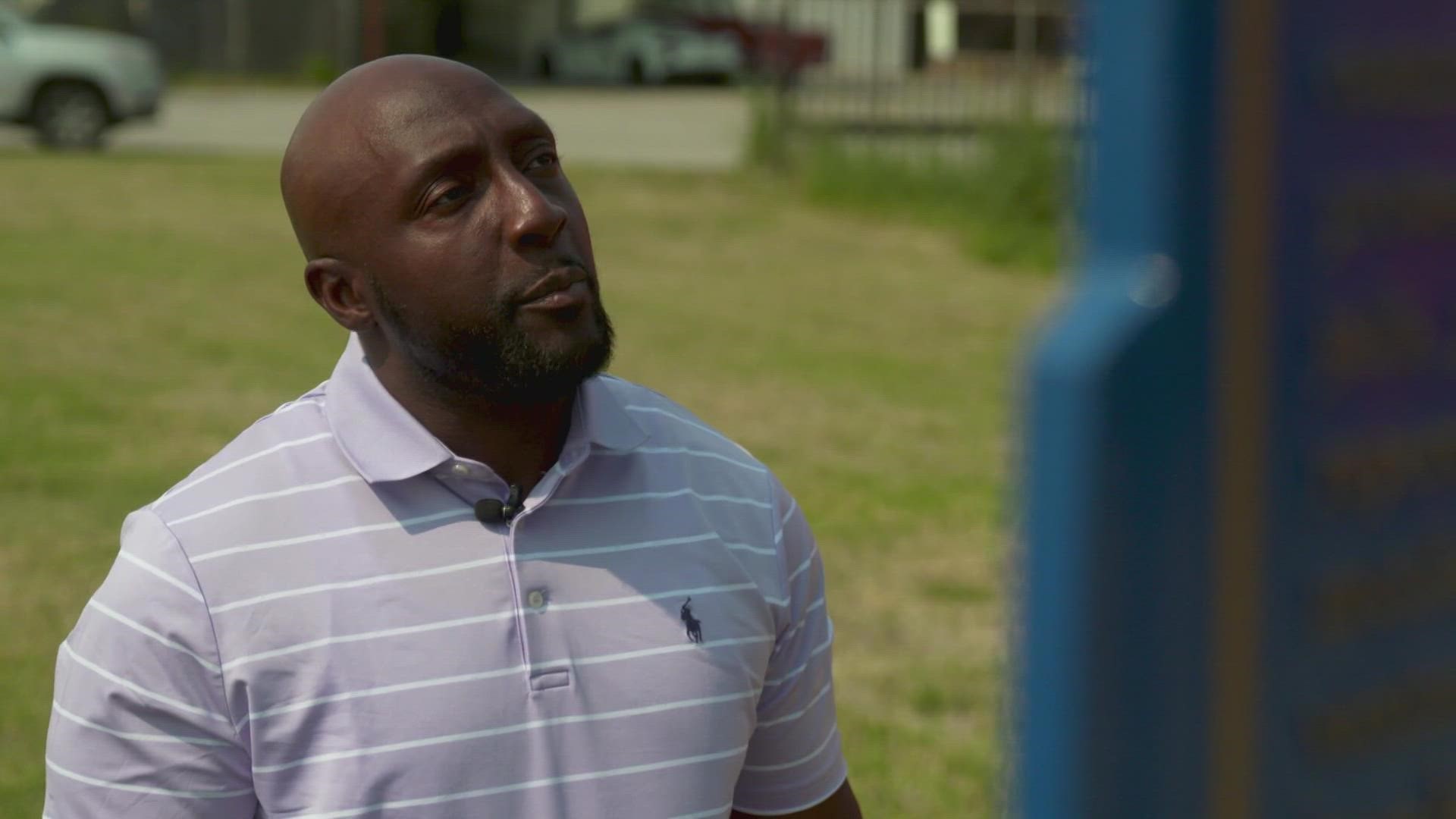FORT WORTH, Texas — In the shadows of the Fort Worth Stockyards, a century-long hidden history is buried.
On the corner of Northeast 12th Street and Samuels Avenue sits the Fred Rouse memorial site. The empty plot of land is the site where the husband, father and black citizen was lynched by a white mob on Dec. 11, 1921.
Rouse, a non-union butcher at Swift & Company meat-packing is the only recorded African American to have been lynched in Tarrant County.
His grandson, Fred Rouse III never knew the story of his grandfather’s murder.
“I’ve been in Dallas-Fort Worth my entire adult life since I was 22 and never knew anything about the story," Fred Rouse III said.
That all changed when the North Texas man’s phone rang on a quiet evening in 2021.
“Boom. It’s like lightning struck,” Fred Rouse III said.
Rouse III, 46 at the time, was at home watching the NBA finals when the call came in. It was about his genealogy.
That’s how Rouse III learned that his grandfather, Fred Rouse, was the victim of a lynching more than 100 years ago.
From that day on, nothing was the same. Rouse III was in a state of shock.
“I was in very much denial,” Rouse III said. “I was angry, I was horrified … at the same time, I was embarrassed to have to tell people that this happened.”
Rouse III told WFAA that his own father never shared the story of what happened to his dad.
“They took his dad from him. My dad was a baby when his father was murdered, so he never got a chance to grow up with his father,” Rouse III said.
Ever since he learned the true story of his family history, Rouse III has connected with cousins he never knew he had. Through them, he has learned more about the tragedy’s toll on his family.
“He took that anger to his grave, he was just so hurt. Never told my mom, never told anybody,” Rouse III said.
What happened to Fred Rouse?
The attacks on Mr. Fred Rouse lasted from Tuesday, Dec. 6, 1921, until Dec. 11, 1921.
According to the Tarrant County Coalition for Peace and Justice, Rouse was first attacked by a white mob in the stockyards.
Rouse, a Black, non-union butcher for Swift & Company in Fort Worth, couldn’t join white employees when they went on strike in 1921. Employees like Rouse were often called upon to fill the jobs left vacant by those striking.
When Rouse was first attacked on Dec. 6, 1921, a white mob bludgeoned him and left him on Exchange Avenue. Police officers transported Rouse to the mortuary, but discovered he was still alive.
From there, they took him to the City & County Hospital in downtown Fort Worth.
Five days later, on Dec. 11, 1921, a mob of white men abducted Rouse from the hospital and drove him to what was known as the “Death Tree,” which sat at the corner of Northeast 12th Street and Samuels Avenue.
The white mob hanged Rouse from the tree and left his body covered in bullet holes. More than 100 people drove to the site to observe the aftermath of his murder.
Members of the white mob were indicted, but no one was ever found guilty for Rouse’s murder.
Rouse's spirit lives on
Decades later, Rouse III grapples with the question: Why was his grandfather brutalized?
Transform 1012, a non-profit coalition of organizations is determined to make sure Rouse’s story will be told for generations to come.
The project was created to transform the former KKK Texas headquarters in Fort Worth into a community and arts space for healing. Several organizations have partnered to make it happen, including: DNAWORKS, LGBTQ SAVES, Opal Lee Foundation, SOL Ballet Folklorico, Tarrant County Coalition for Peace and Justice, The Welman Project, Window to Your World and the 1012 Youth Council.
LGBTQ Founder Sharon Herrera told WFAA people must know and understand the truth about what happened to Rouse.
“One word: hate. That is the word. That triggered everything,” Herrera said. “The history of the city, the unknown history that has come to light… We’re gonna turn that history around and make it something positive, something from the heart.”
Adam McKinney, President of TCCPJ and Co-Founder of DNAWORKS has worked tirelessly to uncover the history surrounding Rouse’s lynching.
“We believe that members of the KKK were involved in the murder of Fred Rouse, because of the manner in which he was murdered by hanging, by shooting, and first being abducted,” McKinney said. “Those were performed and re-performed enactments and practices by the KKK. In working with the Rouse family and placing them at the center of this work, we’re healing from the inside.”
More than 100 years later, Rouse III visits the site of his grandfather’s lynching and speaks to his spirit.
The first time Rouse III went to the site, he sat in his car and struggled to confront his family’s painful past. Now, a century after his grandfather was lynched at the site, Rouse III wants to set things straight and rise above the hatred.
“They thought they killed the name Fred Rouse. They thought they killed the man, Fred Rouse," Rouse III said. "But 100 years later, Fred Rouse came back in the form of me. His blood came back. Not on the ground, but in a body... And his name still lives on."

